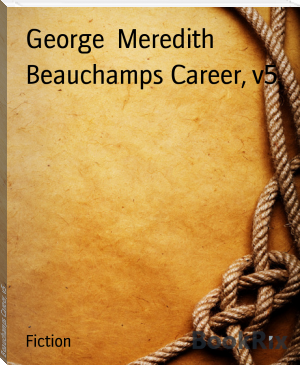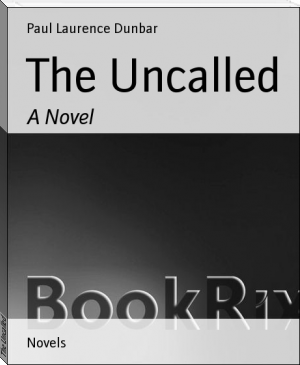Both Sides the Border: A Tale of Hotspur and Glendower by G. A. Henty (literature books to read .txt) 📗

- Author: G. A. Henty
Book online «Both Sides the Border: A Tale of Hotspur and Glendower by G. A. Henty (literature books to read .txt) 📗». Author G. A. Henty
Oswald and Roger aided in getting up the sails, and in a few minutes the smack was at sea. The wind was from the southwest, and the boat ran rapidly up the coast.
"The earl will be in a nice way, when he finds that you have gone," Roger said, as he stood in the stern to watch the rapidly receding towers of Dunbar. "There will be a hot hue and cry for you. The earl is not accustomed to be thwarted, and they say that he is a mighty hot-tempered man. I have no doubt that, as soon as his fellows bring him word of what has happened to them, and he finds that you have quitted the inn, he will send parties of horse out to scour the roads to Berwick and Haddington; and to search the country, far and near."
"He is welcome to do that," Oswald said. "My fear is that he will send down to the port, to inquire if any craft put out about the hour at which his men were attacked. But even if he does so, there is no great chance of our being overtaken. We are travelling fast, and in another hour it will be dark; and long before daybreak we shall reach Leith, having both wind and tide in our favour, all the way."
They kept an anxious watch, as long as there was light enough for them to make out if a vessel left Dunbar. Both fancied that they could see a sail, just as twilight was falling, but neither could be sure that it was not the effect of imagination. They were already ten miles away, and as the tide had now begun to make along the shore, it was certain that for some time, at least, a ship, however fast she might be, would gain but little upon them, until she had fairly entered the Firth. There would be no moon and, even should she overtake them, she might well pass them in the dark.
When they lay down, they agreed that they would keep awake in turns; and that, if they made out a ship apparently pursuing them, they would offer the skipper the full value for his boat, and betake themselves to it, and row for shore.
"The greatest danger," Roger said, "would be of their passing us, unseen; and then lying-to near the entrance of the port, and overhauling us as we came in."
"That is a danger that we cannot guard against. Can you swim, Roger?"
"It is years since I have done so," the monk replied, "but I used to do so, in the old days."
"There is an empty cask here, by my side," Oswald went on. "If we are challenged, the best plan would be to lower it down, quietly, into the water; and to hold on by it. The boat would certainly go some distance, before she had lost her way and brought up; and we should be out of sight of both ships, before they came together."
"That is a good idea. If we hear a hail, I will at once cut a good length of rope, and twist it round a barrel for us to hold on by. But I don't think there is any chance of our being overhauled."
"I agree with you in that respect; still, it is just as well to have our plans prepared, in case it should happen."
They kept a vigilant watch through the night, without catching sight of any craft proceeding in the same direction as themselves.
It was still dark when the helmsman hailed the skipper: "I see the lights of Leith ahead," and later they passed the beacon fire that marked the entrance to the port. Five minutes later Oswald and his companion, after paying the sum agreed on, stepped on shore.
"That danger is over. I did not think that there was any real cause for fear. I should like to see the earl, as his bands of horsemen ride in, today, with the news that they can hear nothing of us."
"I should like to hit him just such a clout, with my staff, as I gave his two retainers," Roger said. "Earl as he is, it was scandalous, and contrary to all usages, to arrest a messenger; especially when that messenger is an esquire of one of equal rank to himself, and his message, as I suppose, a friendly one."
"I don't so much blame him. He had no means of judging my discretion; and the consequences, to him and others, had I fallen into the hands of Douglas, or those of a marauding leader, might have been serious, indeed. I doubt not that, had I been content to stay with him, he would have treated me with all honour. I might even have done so, and have got him to send another messenger to Percy; but the latter bade me to return at once, and moreover said that he had another mission, as soon as I had carried the present one to a successful termination."
"And have you done so, Master Oswald?"
"Yes, I think so, Roger. I was to ascertain the earl's real intentions regarding certain matters, and I think that he means honestly to adhere to an offer he made. The very fear that he has shown, lest his intentions should be betrayed, seems to prove that he is most anxious that naught should occur to interfere with his plans."
"The Earls of Dunbar have ever been a treacherous race," Roger said earnestly, "and ready to betray their own countrymen, in order to curry favour with England, and continue in possession of their estates. However, as we have benefited from it, we need not grumble, if the Scots are contented.
"Now, Master Oswald, what are we to do next?"
"I should say that we had better find a corner to lie down, until daybreak. I don't think that either of us have slept. Then we will go into a tavern and breakfast, and afterwards go on to Edinburgh. I should like to see the town and castle, and the chance may never come again to me.
"Then, tomorrow morning, we will start in earnest. We shall have plenty of opportunities to talk over our plans, so let us lose no time, now, in looking for a bed."
Fortunately, they soon came upon some fishing nets, carelessly piled under the lee of a stack of timber. Here they threw themselves down, and were soon fast asleep.
When they woke, the sun was well up. Fishermen were preparing to get up sail; and those who had, like themselves, come in during the night, were commencing to unload their cargoes.
"Look there!" Oswald exclaimed, as he pointed to a vessel, from whose masthead floated a flag with the arms of the Earl of March. "She is just entering the port. They did chase us after all, you see, but they did not gain on our fishing boat."
"Well, methinks that we had better be off, at once," Roger said. "They will soon learn which boat has come from Dunbar, and find out from the men what were the disguises worn by us. So we had best lose no time in getting out of Leith."
"They would never dare to seize us, here," Oswald said.
"I don't know that. If they have strict orders to bring us back, they would not feel much hesitation in seizing us, wherever they found us; knowing well enough that the burghers of Leith would not concern themselves greatly about the capture of two drovers, who would probably be charged with all sorts of crime. Were it one of their own citizens, it would be different; but it is scarce likely that the burghers would care to quarrel, with a powerful noble, for the sake of two strangers of low degree. The gates will be open before this, and we shall be safer in Edinburgh than we are here."
Accordingly, they postponed their breakfast and, passing through the town without a pause, issued out by the south gate, and walked briskly to Edinburgh. As soon as they arrived, they found a small tavern, and partook of a hearty meal. Listening while they ate to the conversation going on around them, they found that the young Duke of Rothesay was, at present, staying at the castle.
"Men say that the disputes between him and his uncle, the Duke of Albany, have of late grown hotter."
"That might well be," another said. "Rothesay is a man, now. He has shown himself a brave soldier, and it is not likely that he would support, with patience, the haughtiness and overbearing manner of Albany. It was an evil day for Scotland when our good king, who was then but prince, lamed himself for life; and so was forced, on his accession, to leave the conduct of affairs to Albany, then Earl of Fife. The king, as all men know, is just and good, and has at heart the welfare of his subjects; but his accident has rendered him unfit to take part in public affairs, and he loves peace and quiet as much as Albany loves intrigues, and dark and devious ways. 'Tis a sore pity that the king cannot make up his mind to throw himself into the arms of Douglas, and call upon the nobility to join in expelling Albany from his councils; and to give the charge of affairs into the hands of Rothesay, or even to bestow upon him the kingly dignity, while he himself retires to the peaceful life he loves."
"That would have been better done," the other said, "before the young duke married; for many of the nobles, who would have otherwise supported him, would hold aloof, seeing that the accession of Rothesay would be but handing over the real power of the state from Albany to Douglas. Men say that the feud between March and Douglas grows hotter and hotter, and that the boldness with which March upbraided the king, for the breaking off by Rothesay of his marriage with Elizabeth of Dunbar, has so angered him, Rothesay, and Albany, who had aided in bringing about the match with Elizabeth Douglas, that 'tis like that March will, ere long, be arraigned for his conduct, and the threats that he uttered in his passion."
"Well, gossips, it matters little to us," an elderly man said. "Whether king or prince or duke is master, we have to pay; and assuredly, were Rothesay king, our taxes would not abate; seeing that he is extravagant and reckless, though I say not that he has not many good qualities. But these benefit, in no way, men like ourselves; while the taxation to support extravagance touches us all."
There was a murmur of assent from the little group who were talking, who struck Oswald as being farmers, who had come in from the country to sell cattle to the butchers of the town. They were interrupted in their talk by the landlord, who came across to them.
"My good friends," he said, "I pray you talk not so loudly concerning princes and nobles. It is true that we are a royal city, and that the burghers of Edinburgh have their rights and their liberties; nevertheless, it were dangerous to talk loud concerning nobles. We are quiet people all, and none here wear the cognizance of Douglas or Albany. Still, it would do me much harm, were it reported that there had been talk here concerning such powerful nobles; and though the Douglas might care little what was said of him, methinks that there are others--I name no names--who would spare neither great nor small who incurred their resentment."
"I knew not that we were talking loudly, John Ker; and methinks that none, save the two men at the near table, have heard our words; and they look honest fellows enough. Still, what you say is right, and while we may talk of these things by our firesides, 'tis best to keep a silent tongue, while abroad."
"You need not disquiet yourself about us," Roger broke in. "We have no communion with lords or princes; and, so that we can drive our herds safely down into Cumberland, we care not whether one noble or another has the king's ear. We have but just returned, from England."
"Well, man, I may put you in the way of getting a job, if you want one," the eldest of the party said. "I myself have a small farm, near Lavingston, and but breed cattle for the Edinburgh market; but I have a brother, at Lanark, who buys cattle up in the north; and, when there is peace between the countries, sends the droves down to Carlisle, and makes a good profit on their sales. I saw him but two hours ago, and he told me that he was daily expecting a lot of cattle from the north; and that he intended to send them on, without delay, to Carlisle. If you say to him that you have seen me, and





Comments (0)